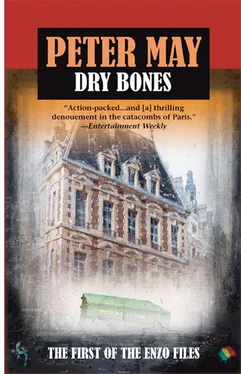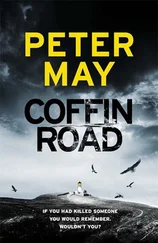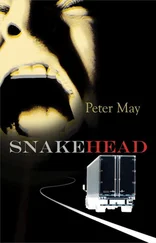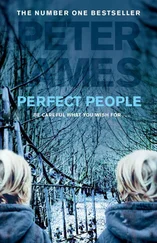‘What time is it?’ he asked Simon.
‘Just gone ten.’
They had lost nearly twelve hours, and it would be after midday before they got to Paris. God only knew what might have become of Kirsty in that time.
The seventeenth century wooden staircase was protected by the Beaux Arts, the concierge told them.
It had taken ten minutes, and a studious examination of Enzo’s Carte de Séjour to convince her that he was Kirsty’s father. Finally, reluctantly, she had given him the key. She would not come up with them, she said. She was no longer able for the climb.
The staircase ended abruptly on the third floor, and a narrow corridor led to a spiral stairway which took them up another three flights. By the time they reached the top landing, Enzo was breathless. Sophie, too, was breathing hard. But she was impressed. ‘She must be fit, my half-sister. You wouldn’t go out casually for a coffee, though, would you?’
Enzo waited with Sophie and Bertrand until Raffin, and finally Simon and Nicole, completed the climb. Simon was panting and red-faced. ‘Jesus,’ he said. ‘She certainly knows how to discourage visitors.’
Rain battered against a narrow window in the stairwell. It opened on to a fire-escape. Six floors of flimsy steel ladder. It was a long way down. Enzo slipped the key in the lock and opened the door. Immediately he smelled her perfume, the same scent she had been wearing the day he left her shopping bags at the foot of the stairs. Its almost tangible presence seemed only to underline her absence, and it caused a sickening lurch in his stomach. He feared the worst.
The studio apartment was tiny, built into the slope of the roof. There were two windows on the east side, and one facing west over a wet Paris roofscape of tall chimneys and television aerials, towards the twin towers of Notre Dame. It was a stunning view, almost unreal, like a set from a fifties Hollywood movie. The sun, Enzo realised, would go down behind the cathedral. His daughter must have had one of the most privileged sunset views in Paris.
Kirsty’s personality filled the room, even though she had not been there for days. Her clothes were draped over a chair. A bed settee, pushed up beneath one of the east-facing windows, was folded down, unmade since the last time she had slept in it. The shape of her head was still pressed into the pillow. With a jolt he recognised the soft toys lined up along the top of the settee. A threadbare panda with one of its eyes missing, a large cartoon pussy cat with its head tipped to one side, an old-fashioned dolly in a faded blue ruffled dress. One of its red shoes had been lost. These were things he had bought her when she was barely old enough to walk. Much-loved toys which had gone with her everywhere. Overnights at her grandparents, weekends at the home of her best friend, midge-infested camping holidays in the Highlands. Panda, pussy and dolly always went, too. Even here, to Paris, apparently. Even after all these years.
But wherever she was now, for once she had left them behind.
Sophie followed his gaze. ‘Pretty crappy toys.’ Enzo heard the jealousy in her voice.
‘No one touch anything,’ he said. And with difficulty added, ‘We might be looking at a crime scene.’
He cast his eyes quickly around the room. The walls were painted a pale yellow. There were some cheap pictures on the gable, bought from street artists in Montmarte. Clichéd views of the old square. A huge movie poster of Gone With The Wind , the lurid flames of Atlanta glowing red behind Clark Gable, the prostrate figure of Vivien Leigh draped in his arms. There were shelves of books and CDs. A laptop computer open on a small table below the west-facing window. A stout wooden beam followed the slope of the roof, creating a semi-partition between the living area and a minuscule kitchen flooded with light from the window on the east side. A small, cluttered dining table was pushed in below the beam.
Enzo saw, lying on a kitchen worktop, a hand-written card with a thumb tack pushed through its centre. Kirsty, elle est chez-elle . A note, left perhaps for friends downstairs, so that they knew whether or not she was at home before embarking on a long, fruitless climb to the sixth floor. Today her father had made the climb because he knew that she was not at home, and he wondered why the note was here. Surely she would keep it with her when she was out, so that she could pin it up at the foot of the stairs when she returned?
‘Monsieur Macleod….’ He turned, and Nicole nodded towards the dining table. ‘Look.’
He looked, and at first saw nothing unusual. An untidy pile of books, an open box of sponge cakes, a medal of some kind. ‘What?’
‘The cakes,’ she said insistently.
And he realised with a shock that drew the skin tight all across his scalp, that it was a box of Madeleine cakes. A message. He knew it instantly. This casual arrangement on the kitchen table was a carefully constructed note, just for him, the box of Madeleine cakes a signature.
Raffin stepped forward to look at the table. ‘What is it?’ He saw only what anyone else would have seen. Innocent clutter in a young woman’s apartment. Had the police made a search of the place they would certainly have missed it, probably disturbed it, destroying it in the process.
Enzo was having trouble controlling his breathing. ‘I’d say it was probably a ransom note.’
Simon frowned. ‘What are you talking about?’
‘Madeleine. She’s telling me she’s got Kirsty.’ He carefully lifted the box of cakes and laid it to one side. He had run out of latex gloves, but he did not believe that the woman called Madeleine would have been foolish enough to leave fingerprints. He pulled up a chair and sat down to examine the remaining items on the table. The others crowded around. ‘I’ve already been inside her head. She knows that I know how she thinks. But, in any case, she won’t have made this too difficult.’
There were three books. An unabridged version of Victor Hugo’s Les Misérables . A book called Les Artistes Font le Mur, which appeared to be a largely photographic record of a fresco sixty meters long created by a group of school children. And the prosaically titled Computers, an Illustrated History . The only other thing on the table was a metal cross with four flared arms of equal length, attached to a piece of ribbon. It was black, with the letter W in the centre, the date 1914 on the lower arm, and a faded silver trim around its edges. It was about four centimeters across.
‘What is it?’ Bertrand asked.
‘An Eiserne Kreuz ,’ Enzo said. ‘A German Iron Cross, a medal given out during the First World War.’
‘So what’s the message?’ Simon said.
Enzo raised his hand in irritation. ‘I don’t know. I’m going to have to work it out.’ Somehow the urgency of it was making his mind go blank. It was Nicole who kick-started his thought processes.
‘Victor Hugo’s hero in Les Misérables was called Jean Valjean,’ she said. ‘But he had another persona, didn’t he?’
‘Monsieur Madeleine,’ Bertrand said suddenly, as it came back to him from some long-ago reading.
Enzo’s mind was racing. ‘Yes.’ But there was something else significant, something just beyond his reach. Then all at once he grasped it. ‘There’s a long sequence in the book where Valjean rescues a man by taking him through the sewers of Paris.’
Simon pulled a face. ‘You mean you think she’s taken Kirsty down into the sewers?’
‘No, not the sewers. Below that. The catacombes . After all, that’s where the first body part was found. It would kind of be like coming full circle.’
Читать дальше












